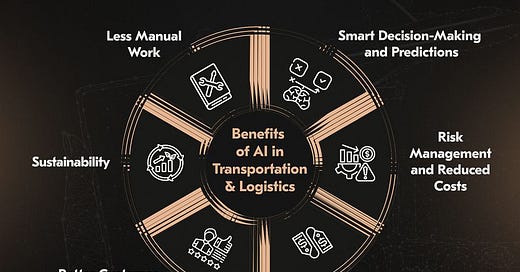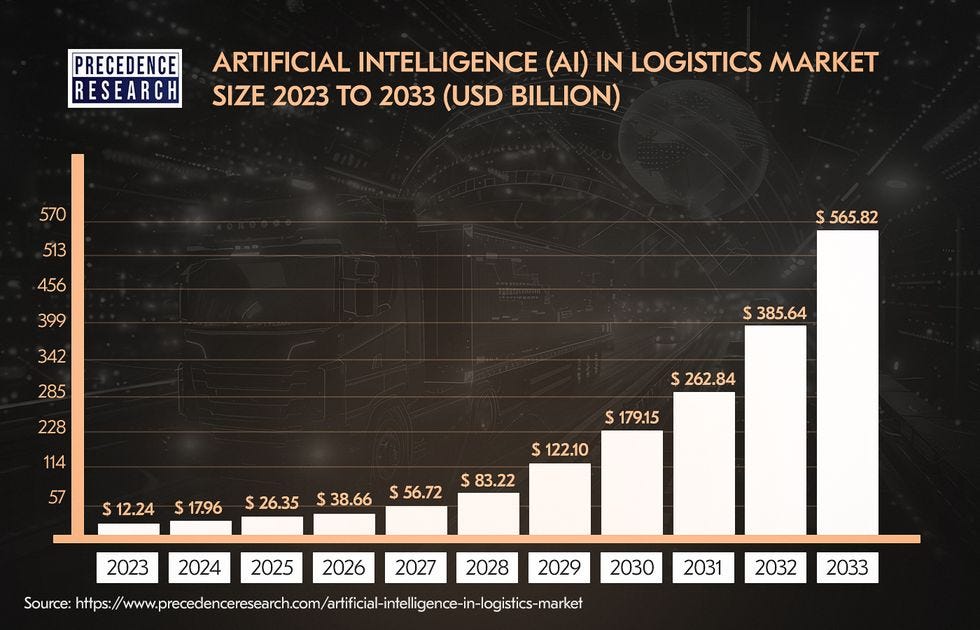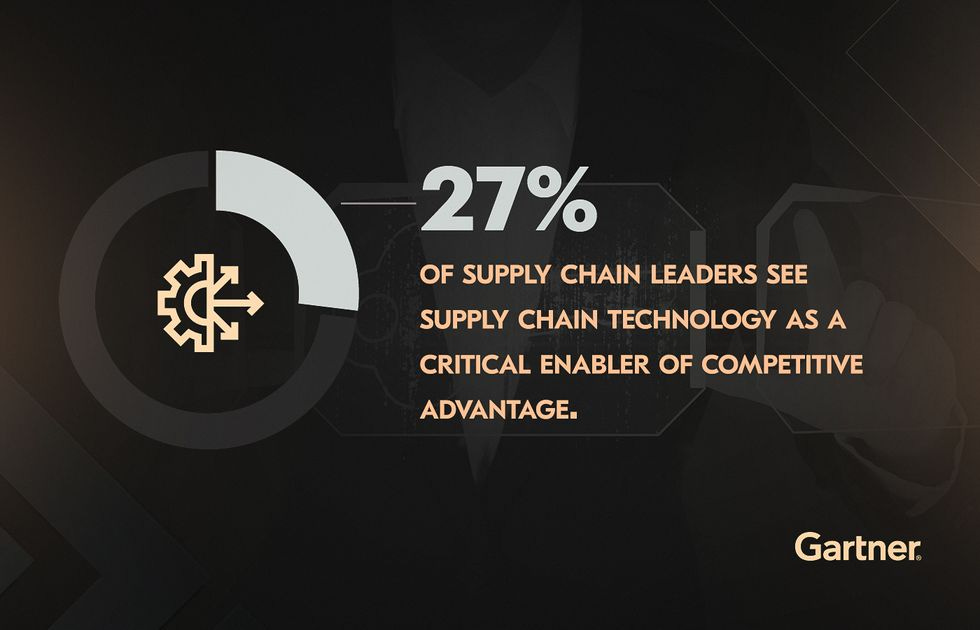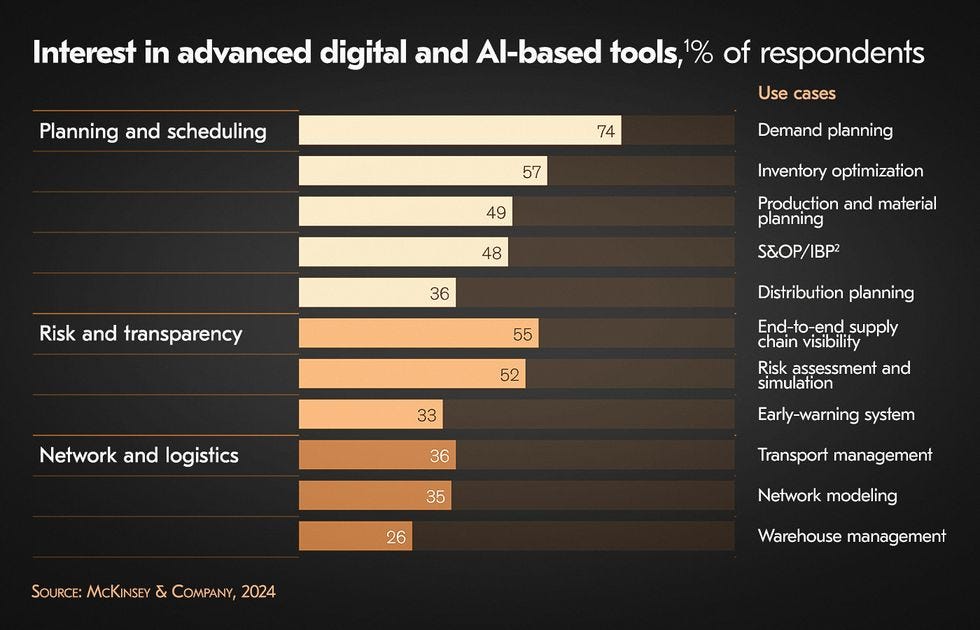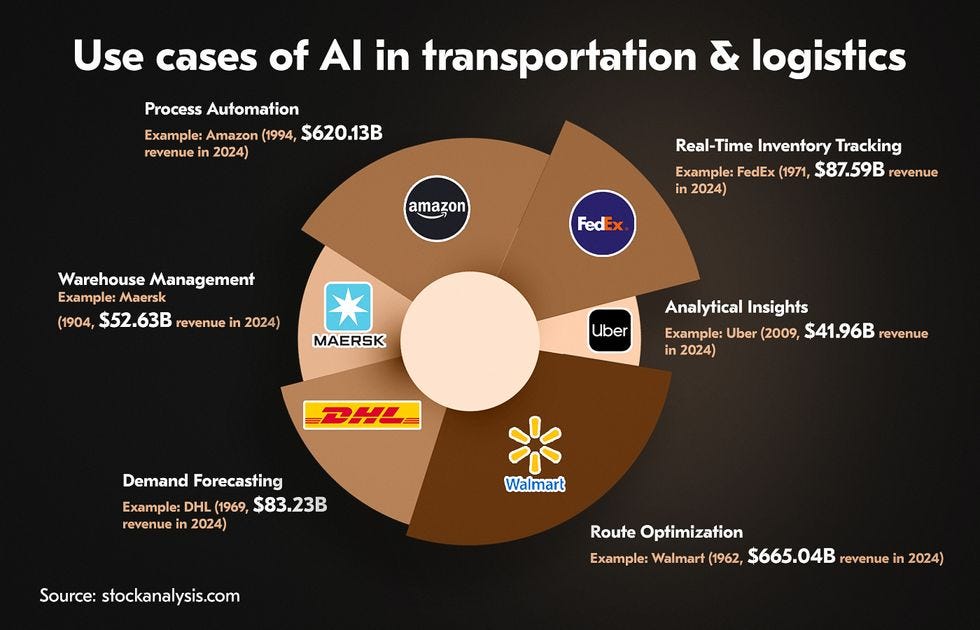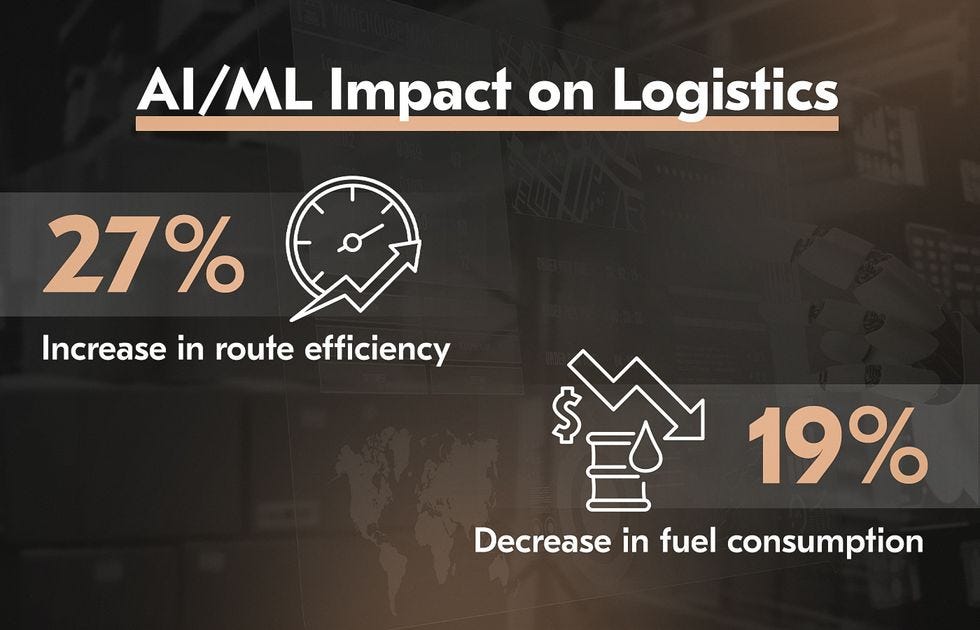Artificial Intelligence (AI) is revolutionizing logistics and supply chain management, solving long-standing challenges like fragmented supply chains, inefficient vehicle routing, market volatility, and sustainability concerns. Companies that successfully integrate AI into their logistics operations are gaining a significant competitive edge by improving efficiency, reducing costs, and enhancing customer satisfaction.
🎯 The Evolution of AI in Logistics
The logistics industry is at a turning point. Traditionally reliant on manual processes and complex coordination, it is now being transformed by AI-driven technologies that streamline operations, reduce costs, and enhance decision-making. With the global AI in logistics market projected to reach $17.96 billion in 2024 and soar to $565.82 billion by 2033, organizations must embrace AI to stay competitive.
But what does AI in logistics really mean? In simple terms, it leverages machine learning, predictive analytics, and automation to tackle inefficiencies, enhance forecasting, and optimize transportation networks. Companies of all sizes—whether startups or industry giants—are seeing measurable improvements in operational efficiency and cost savings through AI.
AI in logistics is not a new concept, but its capabilities have advanced significantly over the years. What was once simple rule-based automation has now transformed into highly intelligent systems capable of complex decision-making. The evolution of AI in logistics can be categorized into three key phases:
Traditional AI: Focuses on specific tasks such as demand forecasting, route optimization, and warehouse automation.
Generative AI: Uses large language models to analyze, summarize, and generate new insights from vast amounts of logistics data.
Operations Research & Hybrid AI: Combines mathematical modeling with AI to optimize entire supply chain networks, offering solutions to previously unsolvable problems.
These three approaches work together rather than replacing one another, creating more efficient and resilient supply chains.
🔬 Key Applications of AI in Logistics
1. Predictive Analytics for Demand Forecasting
AI-driven predictive analytics process historical data, market trends, and external factors such as weather and economic conditions to anticipate demand. This allows businesses to optimize inventory levels, reduce stockouts, and minimize excess inventory, leading to cost savings and higher customer satisfaction.
DHL, a global logistics leader, improved operational efficiency by 15% by integrating AI-driven predictive analytics into its supply chain processes.
2. Intelligent Route Optimization & Real-Time Tracking
AI-powered route optimization tools analyze vast amounts of data, including traffic conditions, weather forecasts, and delivery constraints, to determine the most efficient routes in real time. This leads to reduced fuel consumption, lower operational costs, and timely deliveries. In freight transport, AI reduces the number of empty miles traveled, significantly cutting down on waste and carbon emissions.
Uber Freight has successfully reduced empty miles from 30% to 10%-15% using machine learning, significantly cutting down waste and emissions.
3. Warehouse Automation & Robotics
AI-driven robotics are transforming warehouse operations by automating tasks such as sorting, picking, and packing. Advanced warehouse management systems (WMS) powered by AI improve inventory accuracy and optimize storage space, enhancing overall efficiency.
Walmart has integrated AI-driven robotics to streamline its warehouse operations, significantly reducing processing times and labor costs.
4. Smart Freight Matching & Automated Pricing
Companies like Uber Freight leverage machine learning to provide algorithmic carrier pricing, ensuring fair, transparent, and real-time rate adjustments based on market demand and capacity. This eliminates the need for manual negotiations and improves the efficiency of freight booking.
Walmart has integrated AI-driven robotics to streamline its warehouse operations, significantly reducing processing times and labor costs.
5. AI-Powered Customer Service & Chatbots
AI-driven chatbots and virtual assistants handle customer queries, track shipments, and provide real-time updates. This enhances customer experience by providing immediate responses and reducing the workload on human support teams.
For example, Maersk, a global shipping giant, uses AI to detect anomalies in cargo shipments, reducing fraud and enhancing supply chain security.
6. Sustainability & Green Logistics
AI helps logistics companies reduce their carbon footprint by optimizing energy consumption, reducing waste, and improving supply chain efficiency. AI-driven predictive maintenance for transport fleets also minimizes breakdowns and extends vehicle life, contributing to a more sustainable logistics ecosystem.
For instance, Amazon has implemented robotic solutions such as Sequoia and Digit to enhance safety and efficiency in fulfillment centers. Sequoia accelerates inventory storage by 75% and order processing by 25%, leading to faster and more accurate deliveries.
🔧 Challenges in Implementing AI in Logistics
Despite its immense potential, AI adoption in logistics comes with its own set of challenges:
Data Quality & Integration: AI models require high-quality, structured data, which is often fragmented across different logistics platforms.
Skills Gap: The industry faces a shortage of professionals with expertise in AI, data science, and supply chain management.
Cost of Implementation: AI solutions require significant investment in infrastructure, software, and talent.
Security & Ethical Concerns: The use of AI in logistics raises concerns around data privacy, cybersecurity, and algorithmic bias.
Companies that proactively address these challenges by investing in talent, technology, and partnerships will be better positioned to leverage AI’s full potential.
💡 Future Trends: What’s Next for AI in Logistics?
Autonomous Vehicles & Drones: Self-driving trucks and AI-powered drones are expected to revolutionize last-mile delivery.
Digital Twins: AI-enabled virtual replicas of supply chains will help companies simulate and optimize logistics operations.
AI-Driven Procurement: Intelligent procurement platforms will use AI to predict supplier reliability and optimize purchasing decisions.
Hyper-Personalized Logistics: AI will enable highly customized delivery experiences, allowing customers to choose precise delivery times, methods, and sustainability options.
AI & Blockchain Integration: The combination of AI and blockchain will enhance supply chain transparency and security.
🚚 Use Cases of Artificial Intelligence in Transportation & Logistics
The growing complexity of supply chains, and logistics in general, leaves no room for mistakes and uncertainties. Fast decision-making, instant adaptation to the changing needs of the market, and constant improvement are the only ways to stay competitive. This is why the use of AI for logistics is growing.
🔄 The Road Ahead
AI is not just a technological upgrade—it’s a fundamental shift in how logistics operations are managed. Companies that strategically implement AI-driven solutions will not only achieve efficiency gains but also future-proof their businesses against market uncertainties. The future of logistics belongs to those who embrace AI today.


